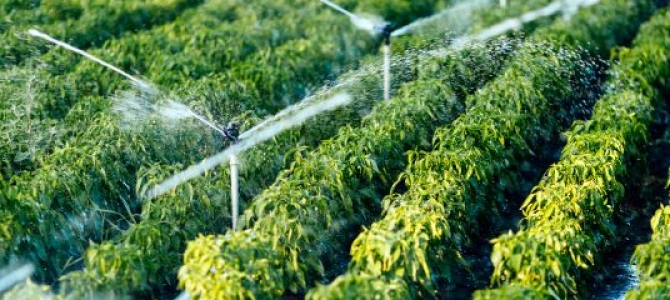 Shopping Cart
Shopping Cart
02 February 2024
How Water Tanks Can Help Farms Increase Production and Efficiency

Water tanks present a viable solution for farms seeking to enhance their operational efficiency and production capacity. By facilitating reliable water storage, these units contribute significantly to ensuring a consistent supply of this essential resource, particularly in periods of scarcity or unpredictable rainfall.
In the face of the increasingly volatile climate, the implementation of water tanks takes on even more critical importance for farmers. Rising temperatures, erratic rainfall patterns, and prolonged droughts can devastate crop yields and livestock health. Water tanks offer a proactive approach to mitigating these climate-related risks. By harvesting and storing rainwater during periods of abundance, farmers can secure a steady water supply, even during droughts. This not only safeguards their current operations but also future-proofs their farming activities against the unpredictability of climate change.
This introduction will delve into the benefits of water tanks in agricultural settings, shedding light on their role in promoting sustainable farming practices, boosting crop yield and improving overall farm productivity.
Understand the Benefits of Water Tanks on Farms
Water tanks play a pivotal role in the agricultural sector, offering a range of benefits that optimise the efficiency, productivity, and sustainability of farming practices. These advantages span across the spectrum of farm operations, from providing a reliable source of watering for crops and livestock to mitigating the risks associated with irregular rainfall and drought. By harnessing natural rainwater, water tanks enable farmers to maximise their utility of this valuable resource, leading to improved crop yield, enhanced livestock health, and overall farm productivity.
Here are four of the key benefits of water tanks on farms:
1. Enhancing Water Conservation Efforts
One of the most significant benefits of using water tanks in farming is the enhancement of water conservation efforts. Rainwater, which would otherwise go wasted, can be collected and stored in these tanks for future use. This rainwater harvesting technique reduces reliance on other water sources that might be under strain or scarce, thereby contributing to sustainable water use in agriculture.
2. Contributing to Cost Efficiency
Water tanks can also contribute to cost efficiency on farms. Harvesting and storing rainwater eliminates the necessity for purchasing water from external sources, which can be particularly cost-prohibitive during periods of drought when prices tend to surge. Over time, the savings accrued from using collected rainwater can offset the initial investment in water tanks, making them a financially sound choice for many farmers.
3. Improving Crop Yield
The use of water tanks facilitates the provision of a consistent water supply, which is crucial for the health and yield of crops. Particularly during dry spells, having a reliable water supply can ensure that crops are adequately watered, leading to healthy growth and increased farm productivity.
4. Promoting Livestock Health
For farms with livestock, water tanks can play a vital role in maintaining animal health. Livestock requires a constant supply of clean, fresh water for their well-being. Water tanks can provide this, ensuring that farmers can keep their livestock healthy and productive even during periods of water scarcity.
With these benefits, water tanks prove to be an integral part of successful farming. They promote the adoption of sustainable practices, contribute to financial efficiency, enhance crop yield, and ensure the health of livestock.
Learn About Different Types of Tanks and Which is Best Suited for Your Farm
Choosing the right type of water tank for your farm depends on several factors including the size of your farm, your water needs, and your budget. Here's a quick rundown of the different types of tanks available:
Polyethylene Tanks
These are commonly known as 'poly tanks' and are a cost-effective solution for many farmers. They are durable, UV-resistant, and come in a wide range of sizes to suit the needs of different farms.
Steel Tanks
Steel tanks are robust, making them suitable for areas with harsh weather conditions or rugged terrain. These tanks are typically coated to prevent corrosion and are a bit more expensive than poly tanks.
Concrete Tanks
Concrete tanks are highly durable and are ideal for farms that require a large storage capacity. They can be built either above or below ground, but installation can be labour-intensive and the costs are higher.
Fibreglass Tanks
Fibreglass tanks are strong, lightweight, and corrosion-resistant. They're easy to install and can be an excellent choice for farms that need a medium-sized storage solution.
Each type of tank has its pros and cons. Therefore, it's essential to understand your specific needs and consult with a professional before making a decision.
Discover How Water Tanks Help Save Money and Increase Efficiency
Investing in a water tank can seem like a significant upfront cost, but the payoffs in the long run are substantial.
Firstly, having a water tank allows for the collection and storage of rainwater, which can dramatically reduce dependence on mains water and thereby lower your water bills. Secondly, the availability of water on demand can lead to improved efficiency in farm operations.
Regular water supply can ensure the well-being of livestock and the health of crops, leading to better yields, and by extension, better profits.
Finally, in times of water scarcity, a tank acts as a safety net, ensuring your farm's operations are not severely impacted. When considering these potential savings and the environmental benefits of water conservation, the return on investment in water tanks becomes apparent.
Find Out How to Maintain Your Tank and Keep It Running Efficiently
Proper maintenance of your water tank is crucial to ensure it operates efficiently and lasts for many years. It includes:
- Regular Inspection: Inspect your tank regularly for signs of damage or wear. Look for cracks, leaks, or corrosion. Regular checks will allow you to address any issues promptly, preventing further damage.
- Cleaning: Over time, debris and sediment can accumulate in your tank, which can affect the water quality. It's recommended to clean out your tank every 2-3 years.
- Monitor Water Quality: Regular testing of the water in your tank can help spot any irregularities, ensuring the water is safe for farm use.
- Protective Measures: Protect your tank from harsh weather conditions and direct sunlight. Consider using covers, shades, or insulating materials.
- Professional Assistance: For any complex issues or regular maintenance checks, consider hiring a professional. They can provide expert advice and ensure your tank is in optimum condition.
By following these steps, you can ensure your tank remains effective and efficient, offering you a steady and reliable water supply for your farm operations.
Discover Tips on How to Maximise Your Investment with a Water Tank
Maximising your investment in a water tank involves more than just the initial purchase and installation. It also depends on how wisely you use the collected water and the maintenance practices you adopt.
- Water Usage: Be judicious in using the water stored in your tank. Use it for essential farm activities like irrigation and livestock watering. Prioritise its use based on your farm's unique needs and water availability.
- Water-Saving Practices: Incorporate water-saving practices in your day-to-day operations. This can include rainwater harvesting, soil moisture management, and efficient irrigation techniques. By doing so, you can extend the utility of your stored water and save on water costs.
- Preventative Maintenance: Regular maintenance not only maintains the efficiency of the tank but also prevents potential issues that might require expensive repairs. By investing in preventative maintenance, you can prolong the lifespan of your tank and maximise its benefits.
- Government Grants and Subsidies: Look for governmental and environmental grants or subsidies that reward water conservation practices. These financial aids can help offset the cost of your tank and contribute to a quicker return on your investment.
Remember, the goal of your water tank is not only to serve your immediate water needs but also to be a sustainable, cost-effective component of your farm's operations for years to come.
Learn About Innovative Technologies That Can Help Improve Productivity with Water Tanks
In the age of smart farming, several innovative technologies have emerged to help farmers optimise the use of their water tanks. One of these is the water tank level indicators from Smart Water. These devices are designed to provide real-time information on water levels in the tank, enabling farmers to better manage their water resources.
Smart Water's water tank level indicators use wireless technology, making them easy to install and operate. This device allows farmers to monitor water levels in their tanks from anywhere, anytime, thus avoiding the need for manual checks and the risk of water shortages. Additionally, it brings a high level of precision to water management, helping farmers plan their irrigation schedules more effectively and efficiently, ultimately leading to increased productivity.
Another revolutionary tool that is making waves within the farming community is the automated irrigation system. These systems, such as those offered by AgSense, can tap directly into your water tank and distribute water across your crops in an efficient and controlled manner. These systems use weather data and soil moisture readings to fine-tune irrigation schedules, ensuring that your crops receive optimal hydration without wasting precious water resources.
Rainwater harvesting solutions like those from Rainwater Management Solutions take it a step further by incorporating filtration and purification methods. This ensures that the collected rainwater is not just stored effectively but also safe for various applications, including irrigation and livestock watering.
In the face of a rapidly changing climate, these smart technologies are providing farmers with the tools they need to manage their water resources more effectively, ensuring the sustainability and profitability of their operations.
By embracing such innovative technologies, farmers can not only enhance their water management but also improve overall farm productivity. These devices are a practical investment towards sustainable farming, offering significant returns in the long run.
Frequently Asked Questions
Are water tanks suitable for farms in areas with low rainfall?
Yes. Even in low-rainfall regions, water tanks help capture every possible drop and store it for critical periods. They also allow farmers to supplement tank water with bore, well, or trucked-in water when needed, improving resilience during droughts.
What features should farmers look for when choosing a water tank?
Key features include durability, UV resistance, large capacity, compatibility with pumps and filtration systems, and ease of maintenance. Farmers may also benefit from pairing their tank with a smart water-level indicator for better monitoring and management.
How often should a farm water tank be cleaned and maintained?
Most farm tanks should be cleaned every 2–3 years, with regular inspections done annually. Checking for cracks, leaks, sediment buildup, and pump performance helps keep the system efficient and ensures high-quality water for crops and livestock.
